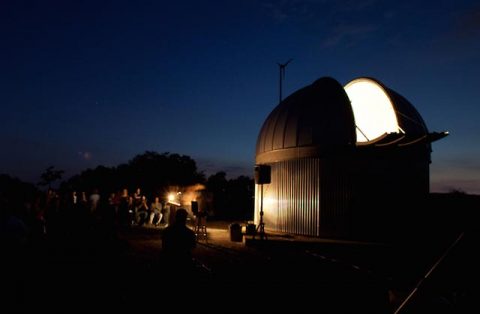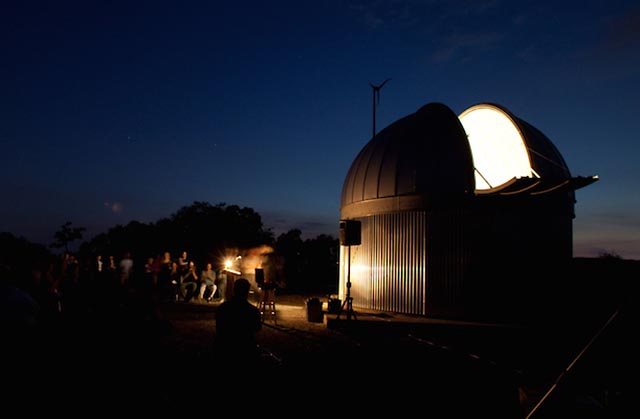 Clarksville, TN – On Monday, August 21st, 2017, the heavens—in the words of English poet Lavinia Greenlaw—will throw a “celestial dimmer switch” during the 2017 Total Solar Eclipse, and as excitement builds across the country for this cosmic spectacle, Austin Peay State University is hosting several events, including an official NASA viewing parties at the campus’ Fortera Stadium.
Clarksville, TN – On Monday, August 21st, 2017, the heavens—in the words of English poet Lavinia Greenlaw—will throw a “celestial dimmer switch” during the 2017 Total Solar Eclipse, and as excitement builds across the country for this cosmic spectacle, Austin Peay State University is hosting several events, including an official NASA viewing parties at the campus’ Fortera Stadium.

The University’s Clarksville, Tennessee, campus is situated near the epicenter of this historic event, meaning the sky will go dark for more than two minutes—one of the longest periods of darkness in the entire country.
To take advantage of Austin Peay’s fortunate location, University officials have spent the last several years organizing its PeayClipse events. On August 20th and 21st, APSU will offer several extraordinary opportunities for individuals to witness the total solar eclipse.
Free talk by former NASA astronaut
At 7:00pm on Sunday, August 20th, Dr. Rhea Seddon will deliver a free talk on her experience as one of NASA’s first female astronauts at the Austin Peay State University Dunn Center. An hour before the talk, at 6:00pm, Seddon will sign copies of her book, “Go for Orbit,” in the Dunn Center. The lecture and book signing are part of the University’s PeayClipse celebration, commemorating the historic solar eclipse.
Launch art exhibit
At 8:45pm on August 20th, Dr. Mclean Fahenstock, APSU assistant professor of art, and Michael Dickins, APSU gallery director, will present “Launch,” a multimedia experience that combines video projection, audio collage, and a vibrating viewing platform, on the outside of the Dunn Center.
PeayClipse Educational Experience
At 10:00am, the University will host a special PeayClipse Educational Experience for school-age children in the campus’ basketball arena, the Dunn Center.
“We have 10 different activity stations for them to move through that are educational and fun,” Dr. Karen Meisch, associate dean of the APSU College of Science and Mathematics, said.
The activity stations include:
- A moon walk experience (bounce house)
- A coloring station
- Make your own sundial
- Make your own projector system (to safely view the eclipse)
- Create an edible sun (sugar-iced cookies) with sunspots (chocolate chips) and solar flares (licorice)
- A space education table with telescopes, books and information on different astronomy topics
- An APSU Geo Club table providing information about moon rocks and the topography of different planets.
- The solar system experience, featuring an inflatable solar system.
- Hearing the sun sing—an audio station that lets participants hear the sounds the sun makes.
- Solar robots, featuring examples of solar-powered machines.
The Dunn Center’s concession stands will be open during the event for attendees to purchase food. At 12:15pm, APSU faculty and students will lead everyone to the campus’ Fortera Stadium to watch the eclipse.
Tickets to the PeayClipse Educational Experience are $4.00 for children, ages 3-15, and each ticket comes with a free pair of eclipse viewing glasses and a wristband for free parking. The event is free for children under three and for adults accompanying a child.
Eclipse Viewing Event at Fortera Stadium:
Austin Peay’s Fortera Stadium will open to the public at 11:30am that day for the public to view the eclipse. The cost is $5.00 to park, with each vehicle receiving a free pair of viewing glasses.
The stadium’s scoreboard will display a live feed from the APSU observatory. Leading up to the eclipse, members of APSU’s Department of Physics and Astronomy will provide scientific and historical context for the phenomena. When the eclipse begins, attendees can watch the event on the scoreboard and through telescopes set up with the solar protection.
Premiere Eclipse Viewing Experience
Individuals interested in a more in-depth experience can purchase tickets to the Solar PeayClipse Lunch and Learn. For a $200.00 donation to the APSU College of Science and Mathematics, which will be used to provide future opportunities for APSU students, participants will enjoy a reception with Dr. Rhea Seddon, former NASA astronaut, before her keynote address at 5:00pm on August 20th, and a meal in the stadium’s club level on the day of the eclipse.
During the meal, Dr. Stephanie Wingo, NASA atmospheric scientist, will deliver a talk, and attendees will receive a commemorative book, solar glasses and a custom-designed commemorative pendant.
To purchase tickets or for additional information, visit www.apsu.edu/eclipse, or contact the APSU Advancement Office at 931.221.7127.
The day will be memorable, and people will want to share the experience with other individuals. On June 30th, 1927, the English writer Virginia Woolf witnessed a total solar eclipse, and she later wrote about the surreal experience in her diary.
“It became darker and darker,” she wrote, “as at the beginning of a violent storm: the light sank and sank: we kept saying this is the shadow; and we thought now it is over—this is the shadow when suddenly the light went out.”



